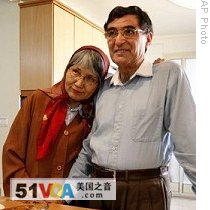Cairo
27 April 2009
American journalist Roxana Saberi, convicted by Iran of spying, is on a hunger strike and vows to continue until she is released from prison. Her father, who visited her in Tehran's Evin Prison says she is "very weak."
 |
| Parents of Roxana Saberi in Tehran, Iran, 25 Apr 2009 |
Reza Saberi, along with his wife Akiko, visited their daughter Sunday in Tehran's Evin prison, for her 32nd birthday.
Saberi says his daughter is so weak from the hunger strike she began last Tuesday that she can "hardly stand up."
He told Reuters news agency he is worried about her health. He said he was unable to persuade his daughter to end her hunger strike and says she vowed to continue until she is freed.
Jean-Francois Julliard, of Paris-based Reporters Without Borders, says both journalists and the world community need to put pressure on Iran to release Roxana:
"We should put more pressure on Iranian authorities, because she is really in danger. She is in a very bad health and she cannot pursue her hunger strike for many days," said Julliard. "So, we have to do something from Europe, from [the] United States, from everywhere to ensure that she is released soon."
Saberi's lawyer, Abdolsamad Khorramshahi, who has lodged an appeal with the Iranian judiciary, has told journalists he believes her case will be heard "soon."
U.S. President Barack Obama and the State Department have called the charges against Roxana Saberi, who has worked for National Public Radio and the BBC, "baseless."
Iran initially claimed Saberi, who has dual U.S. and Iranian citizenship, was arrested because her credentials as a journalist had expired, but later charged her with "espionage", for which she was sentenced to eight years in prison in a one-day closed trial.
Iranian media have barely mentioned the Saberi case, although her Iranian fiancé has written an open letter pleading for her release.
Julliard says Iran does not have a "free press", so it is up to those on the outside to plead her case:
"It is not easy, because most of the Iranian media are not independent, at all, so it is sure that they did not speak about her case and when they speak about her, it is just to say that she was sentenced because she is a spy for the United States," said Julliard. "So, we have to provide them reliable information and we have to convince them that she is not a spy, she is just a journalist."
Iran's foreign ministry spokesman insists that Saberi's case must be dealt with according to the country's laws. "When she is an Iranian citizen," he told a weekly press conference, "all arguments raised by foreigners have no meaning."